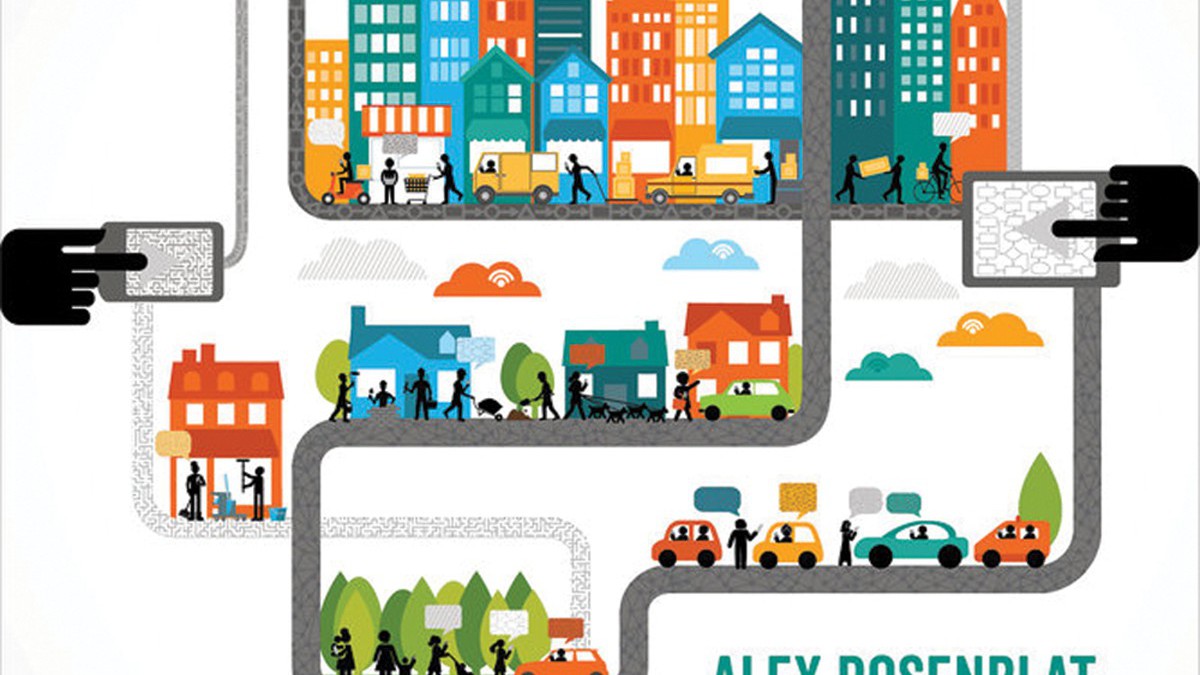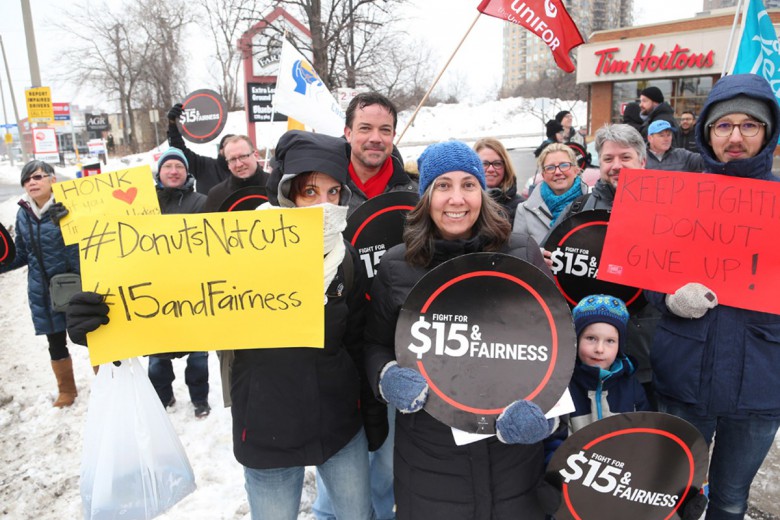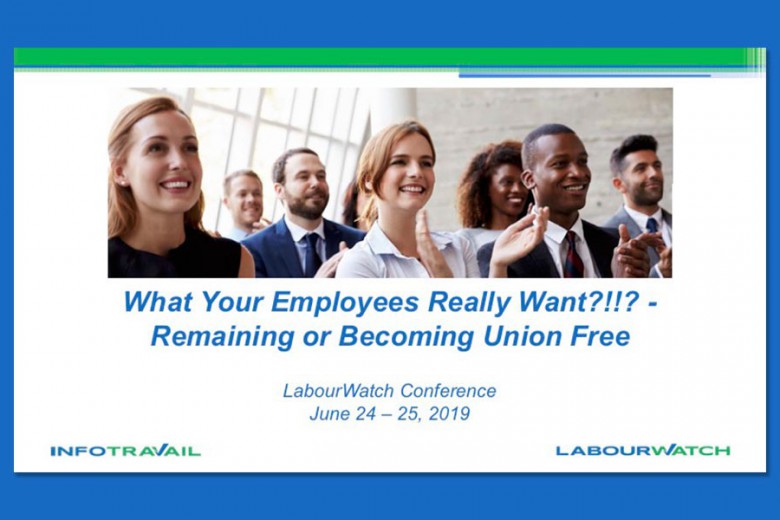Recent immigrants, divorcees, ex-prisoners, wealthy retirees, and a Buddhist monk who quit monastic life for the big city grind. These are some of the many drivers getting fleeced by Uber in Alex Rosenblat’s new ethnography, Uberland: How Algorithms Are Rewriting the Rules of Work. Digital tech has provided Uber with new ways of managing workers and describing what they do – and Uber is using its apparent newness as an excuse to lay waste to existing norms and rules of work.
In their first months of full-time work, most Uber drivers make a living. They enjoy their flexible schedules. But when Uber strengthens its position in the local market, it cuts driver earnings. Soon, drivers struggle to pay their bills, and must spend longer hours on the road. Some of the drivers Rosenblat spoke to felt like Uber was supporting them at first; now it steals their tips and cancellation fees, or finds sly ways of paying them less than the standard 75 to 80 per cent of fares. In the end, Uber gives drivers little compensation and no job security, while promising to make them wealthier and more independent.
In Uberland, Rosenblat exposes gaps between Uber’s altruistic rhetoric and greedy practices. One of the book’s strongest chapters addresses the myth that Uber’s platform simply connects consumers and independent drivers – that it’s an honest and efficient digital broker. This implies that drivers are autonomous, but drivers tell Rosenblat they don’t feel that way under the influence of Uber’s system of rewards and punishments – nudges, surge pricing, and minimum driver ratings. And nor should they. As Rosenblat argues, this myth gives Uber a guise by which it can manage workers, even as it states that drivers are “independent contractors.”
Uber is using its apparent newness as an excuse to lay waste to existing norms and rules of work.
By claiming to regulators that drivers are “independent contractors,” Uber tries to avoid giving drivers sick days and other basic legal protections. By making a similar claim to potential employees, it reframes driver vulnerability as driver autonomy. Rosenblat points out that drivers enjoy a suspect kind of independence: they may be free to choose their own hours, but if Uber is their main source of income, they must work long days and drive at peak hours. They may enjoy not having to grovel to a boss, but they also have no good options when they encounter problems at work. Here, Rosenblat tempers her criticism of Uber with a willingness to consider the meaning that drivers take from such fantasies. Her attention to the idea that Uber provides “a good bad job,” as one driver puts it, contributes to her larger account of why Uber works. Uber works because people believe in working for Uber.
When it’s not asking people to believe in its vision of universal entrepreneurship, Uber is demanding faith in a pseudo-socialist dream: the “sharing economy.” Uber and other boosters of the “sharing economy” ignore the root cause of deprivation: capitalism. Instead, they promise that digital platforms like Uber will enable people to overcome “scarcity” (deprivation) by pooling their limited possessions and skills. Rosenblat argues that Uber relies on the idea of the “sharing economy” to devalue the care work that drivers do. In the “sharing economy,” friendliness and hospitality become a kind of recreational “sharing,” for which Uber doesn’t pay drivers – rather penalizing them when their ratings drop.
Besides remaking itself, Uber is also contributing to larger changes in the ways ordinary individuals define themselves. Rosenblat observes that North Americans increasingly claim their rights as consumers, rather than as citizens or workers. Uber exploits this slippage by using the demands of consumers (who want Uber) as clout against governments that attempt to regulate it as a taxi company. While “consumer” citizens (backed by Uber’s lobbyists) catch the ear of politicians, they have no standing in labour law. So as Uber drivers attempt to unionize, and as cities attempt to hold Uber to the same labour standards as taxi companies, the company insists that drivers, too, are consumers of its software.
Rosenblat argues that Uber relies on the idea of the “sharing economy” to devalue the care work that drivers do.
Conceding that Uber benefits enormously from casting drivers as consumers, Rosenblat offers only a shrug, proposing that Uber’s consistent treatment of drivers as consumers of software might mean that drivers actually are consumers. She writes: “It remains an open question whether the new norms Uber ushers in are better or worse for labour and consumers.” Rosenblat shows us how Uber drives down the price of labour and gets away with miscategorizing work as consumption. Then, bizarrely, she concludes by musing that categories like “boss” and “worker” might no longer mean much in an era of technologically mediated work.
Uber’s success in defeating regulation and undermining organized labour depends on its ability to convince the public that it is exceptional – that conventional categories or rules don’t apply to it. As jarring as Rosenblat’s conclusion is, it isn’t the only place where she believes too readily in Uber’s self-proclaimed exceptionalism. The book’s subtitle – How Algorithms Are Rewriting the Rules of Work – echoes the claims that Uber makes about itself: its importance, its newness, and, above all, its exemption from social responsibility. If we accept the premise that “algorithms” (not capitalists) are asserting control over the future of work, it will be difficult to hold anyone to account for the human costs of unchecked automation.
“Algorithms” won’t reap the profits of automation in our century any more than power looms did in the 19th century; nor has Uber figured out how to transform service work into consumption – an idea that seemed silly even in Marx’s day. At most, Uber has convinced people to talk about work in ways that muddy the distinction between worker and boss. It falls to scholars like Rosenblat to resist Uber’s anti-labour rhetoric. Knowing what makes Uber familiar, as well as what makes it new, is the first step toward organizing its defeat.







